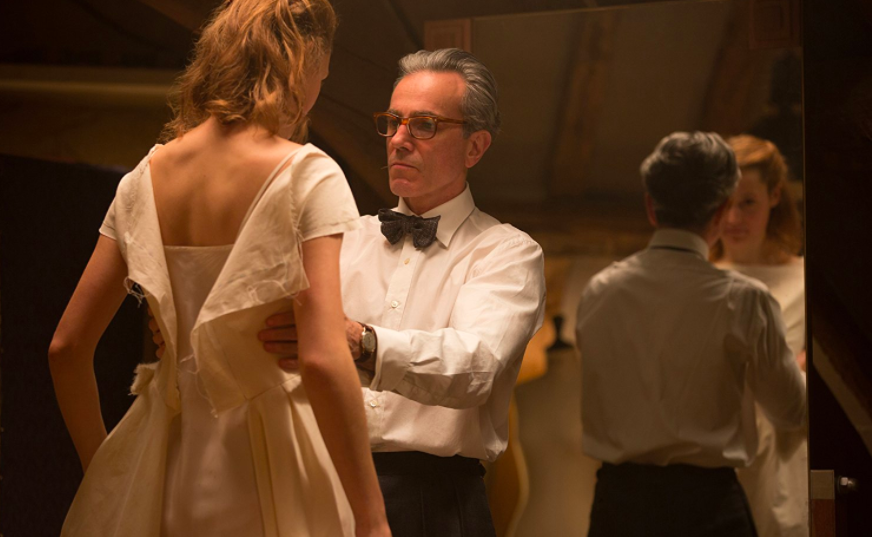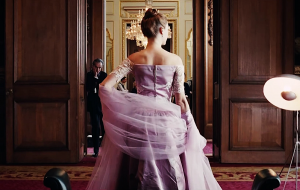Paul Thomas Anderson’s latest—a ravishing, strange film starring Daniel Day-Lewis as a fictional 20th century British couturier—is also, notably, Day-Lewis’ last. In 2017, the acting giant released a statement announcing his retirement, guaranteeing Phantom Thread all the publicity and pressure that accompanies the swan song of one of the most celebrated performers of a generation.
It is difficult to imagine a final role so fitting for the dedicated method actor than Phantom Thread’s Reynolds Woodcock, a man who is, above all else, intensely devoted to his craft. (Day-Lewis reportedly created a Balenciaga dress from scratch in preparation for his turn as the perfectionist designer, much like how he built canoes for The Last of the Mohicans or how he barely left his wheelchair on the set of My Left Foot.) Anderson, who serves as not only the film’s director but also its writer and cinematographer, is himself deeply familiar with the perils of obsession and control. In their second collaboration, he and Day-Lewis develop this thread throughout, linking art to life and back again.
At the beginning of Phantom Thread’s hefty 130-minute runtime, Anderson makes one thing clear: dresses are Reynolds’ fixation of choice and the pretty young things that slip in and out of his realm are mere mealtime distractions. Flanked by his imperious sister Cyril (a pitch-perfect Lesley Manville) and lost in his morning sketches, Reynolds bristles when his latest former muse dares to engage him at breakfast, disrupting his air of careful concentration. Cyril dismisses the offending conversationalist at her brother’s request (this woman is of so little importance that this exchange occurs offscreen), leaving Reynolds free to hurtle his sporty car into the countryside and encounter Alma, his next inspiration.
Played with limpid assurance by Luxembourgian actress Vicky Krieps, Alma begins as a clumsy waitress in a hotel restaurant. Charmed by her warmth (and no doubt by her unblemished youth), Reynolds invites Alma to dinner after he lists off his lengthy order in a voice so dulcet that it sounds like seduction. That evening, he delicately wipes off her lipstick so he may “see” her and later requests that she strip down to her sheer negligee so he may take her measurements for a dress. Despite the erotic setup, implied sex will have to wait. In this moment, Reynolds loves Alma’s body only for its perfect proportions. It certainly doesn’t help that Cyril shows up ready to jot down the numbers that Reynolds dictates, all the while regarding Alma with a look of thin pity. Scenes like these reek of a gentleman’s misogyny, and it is to Krieps’ and the script’s credit that Alma does not dissolve into a swooning puddle at the undeniable power of Reynolds’ gravitas. “If you want to have a staring contest with me, you will lose,” she tells him early on in their partnership, a promise that proves true as the film twists to its macabre end.
Though Reynolds’ repulsive paternalism makes for a less-than-healthy relationship, everything—be it a 4 a.m. fitting or a bitter confrontation on a colorful New Year’s Eve—becomes tinged with romance thanks to Anderson’s lush visuals and Jonny Greenwood’s classical score. The costumes, created and curated by Mark Bridges, are exquisite, born from fairytale-like bits, including Flemish lace from the 1600s, and sumptuous fabric. During a private exhibition for clients, Alma models a burgundy dress as Reynolds watches intently, torturously, from another room. The dress is wonderful, but it is not yet perfect. To watch Phantom Thread is to be like Reynolds in those minutes of mania, pressed up against a keyhole observing a beauty that is too breathtaking to be of this world.
Near the end of the film’s first act, Alma encourages Reynolds to confiscate a dress from a well-paying, unseemly client. All cues indicate that this woman is a disgusting affront to the cultivated elegance of the Woodcock brand: she is unattractive, ostentatious, and a drunk. They storm the woman’s hotel room; Alma reclaims the dress and Reynolds, overwhelmed with gratitude, kisses her on the streets in a sweeping motion, his cherished dress the flourish at the end of their embrace. It is an unabashedly lovely shot, but the triumph meant to be inherent within the gesture feels empty and even exploitative. I couldn’t help feeling that superficiality was sneaking its way into the House of Woodcock; a dress, however beautiful, is just a dress.
Still, there is something mesmerizing about Phantom Thread that goes beyond its stunning production value and that is, upon reflection, intrinsically linked to Day-Lewis’ performance. Reynolds is often infuriating, yet Day-Lewis infuses the character with a latent vulnerability that allows the audience to empathize even when he throws a tantrum about the preparation of his vegetables. It is Alma who brings back to Reynolds a more tender humanity (in a not-so-tender way), but it is Reynolds’ fierce commitment to excellence—and by extension, Day-Lewis’—that binds together man and myth.
In a rare November 2017 interview with W Magazine’s Lynn Hirschberg, Day-Lewis spoke about how he reached his decision to retire after Phantom Thread:
“Before making the film, I didn’t know I was going to stop acting. I do know that Paul [Anderson] and I laughed a lot before we made the movie. And then we stopped laughing because we were both overwhelmed by a sense of sadness. […] I dread to use the overused word ‘artist,’ but there’s something of the responsibility of the artist that hung over me. I need to believe in the value of what I’m doing. The work can seem vital. Irresistible, even. And if an audience believes it, that should be good enough for me. But, lately, it isn’t.”
Phantom Thread is a love story between Reynolds and Alma, but it is also a love story between a master and his art. Day-Lewis, like Reynolds, strives for the extraordinary, seeking to make something that is meaningful and eternal. If this truly is Day-Lewis’ last film, it is oddly comforting to know that he is retiring only because he has given so much of himself in relentless pursuit of transcendent storytelling. I doubt we would let him leave us for anything less.




